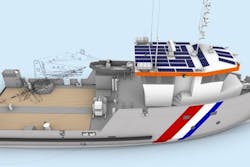Danfoss subsidiary supplying Electric Motors for French Coastal Safety Vessel
Editron, a division of Danish energy equipment firm Danfoss, will supply an electric drivetrain system for a new buoy-laying ship in the French government's fleet.
Editron will equip the vessel with two electric motors, which will allow it to occasionally run at zero emissions and result in a 25 to 30 percent fuel savings compared to a comparable, conventional diesel-fueled ship.
The vessel will be part of “Armement des Phares et Balises,” the French government’s department responsible for signaling dangers and marking shipping routes along the French coast. The vessel will be used to maintain and replace navigational buoys around the island of Corsica.
“Our Editron system is designed for any type of marine vessel, since its benefits – such as lower fuel consumption, reduced emissions, freedom of design and easy integration – are universal,” Erno Tenhunen, marine director for Danfoss’ Editron division, said in a statement. “It is especially ideal for a work boat like this, as the tough requirements for reduced space and weight are no issue for the market-leading power density of our parallel hybrid propulsion system.”
The electric vessel contract is part of the French government’s efforts to decarbonize its marine industry.
ECCS Marine will handle design and integration of the electric system into the 24-meter long vessel. Editron will equip it with two electric motors powered by 150-kWh batteries.
“The buoy-laying vessel will be regularly entering and leaving ports and sailing across Corsica maritime protected areas, so it was important that greenhouse gas emissions and noise pollution were kept to a minimum – something the Editron division was able to ensure with their propulsion system,” Peter Enjalbert, project engineer at ECCS, said. “This project has demonstrated that a totally electrified marine industry is within reach, so we hope this electric vessel will be the first of many for this fleet.”
Related stories
Port of Long Beach joins Shanghai-Los Angeles Green Shipping Corridor
Siemens Energy delivering Diesel-Electric Propulsion and Batteries for NOAA Vessels
Construction has begun on the vessel at the Merre and CIB shipyards in France. It is expected to be delivered by mid-2023.
The maritime industry’s total CO2 emissions grew by almost 10 percent from 2012 to 2018, according to an earlier International Maritime Organization’s (IMO) greenhouse gas study. The sector did improve carbon intensity, but overall emissions rose due to an expansion of shipping capacity.
Close to 90 percent of all global goods are moved by shipping, according to estimates.
-- -- --
(Rod Walton, senior editor for EnergyTech, is a 14-year veteran of covering the energy industry both as a newspaper and trade journalist. He can be reached at [email protected]).
About the Author
Rod Walton, EnergyTech Managing Editor
Managing Editor
For EnergyTech editorial inquiries, please contact Managing Editor Rod Walton at [email protected].
Rod Walton has spent 17 years covering the energy industry as a newspaper and trade journalist. He formerly was energy writer and business editor at the Tulsa World. Later, he spent six years covering the electricity power sector for Pennwell and Clarion Events. He joined Endeavor and EnergyTech in November 2021.
Walton earned his Bachelors degree in journalism from the University of Oklahoma. His career stops include the Moore American, Bartlesville Examiner-Enterprise, Wagoner Tribune and Tulsa World.
EnergyTech is focused on the mission critical and large-scale energy users and their sustainability and resiliency goals. These include the commercial and industrial sectors, as well as the military, universities, data centers and microgrids. The C&I sectors together account for close to 30 percent of greenhouse gas emissions in the U.S.
He was named Managing Editor for Microgrid Knowledge and EnergyTech starting July 1, 2023
Many large-scale energy users such as Fortune 500 companies, and mission-critical users such as military bases, universities, healthcare facilities, public safety and data centers, shifting their energy priorities to reach net-zero carbon goals within the coming decades. These include plans for renewable energy power purchase agreements, but also on-site resiliency projects such as microgrids, combined heat and power, rooftop solar, energy storage, digitalization and building efficiency upgrades.

